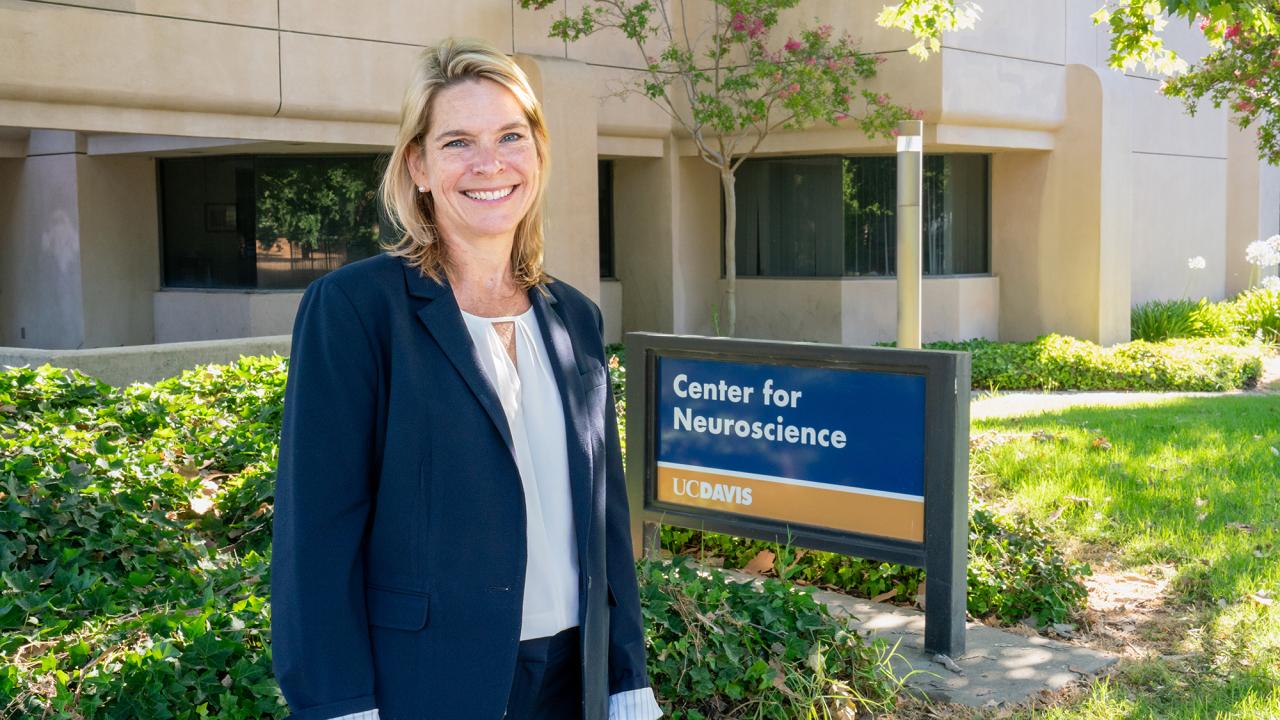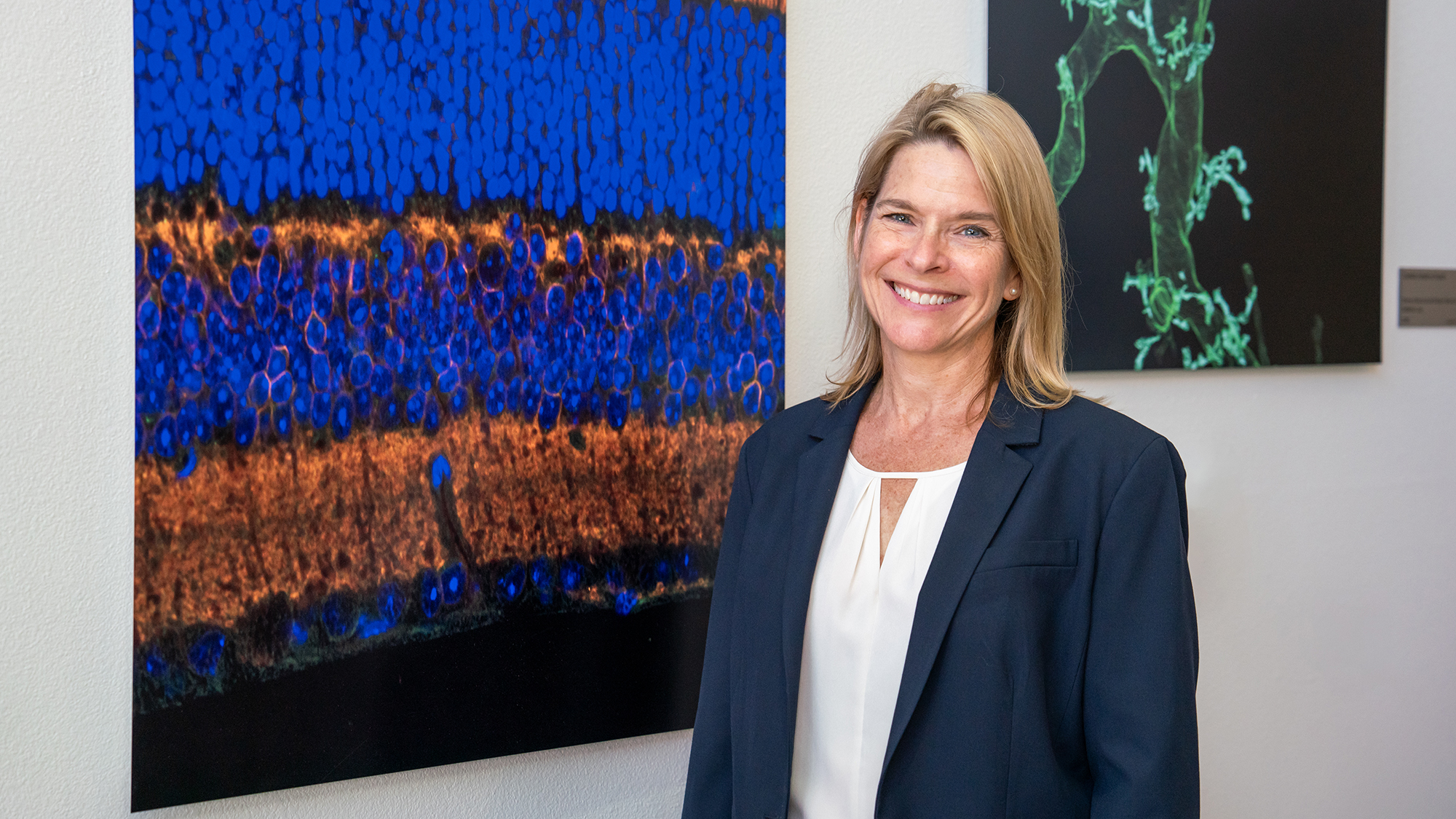
Center for Neuroscience Names Marie Burns New Director
Vision neuroscientist Marie E. Burns has been appointed the sixth director of the Center for Neuroscience (CNS), effective July 1, 2025, after serving as interim director for the past year.
A professor with joint appointments in the departments of Ophthalmology and Vision Science, and Cell Biology and Human Anatomy in the School of Medicine, Burns brings more than 20 years’ leadership experience to the role.
Burns served as the Vice Chair for Research in Department of Psychiatry and Behavioral Sciences from 2004–2007 and the inaugural director of the UC Davis Center for Vision Science from 2007–2012. She has directed the NIH T32 Vision Science Training Program since 2017.
“Marie radiates enthusiasm and passion that inspires others to learn and explore research in brain science,” said Mary Croughan, provost and executive vice chancellor. “Her decades of knowledge and experience at UC Davis are such an asset in this leadership role, and the Center for Neuroscience will certainly benefit from her sincere dedication to the success of its faculty, trainees and staff.”

Vision research focused on preventing neurodegeneration
In 2001, E.G. “Ted” Jones, CNS director from 1998–2009, hired Burns, who had recently received her Ph.D. in neurobiology from Duke University and completed her postdoctoral training at Stanford University.
In the time since, Burns has built a research program focused on how the eye’s light-sensing cells (photoreceptors) work. Her studies have shed light on the chain of chemical signals that allow us to see, how sensitive our vision can be in near-darkness and how these signals are carried inside cells. More recently, she has shifted her focus to immune cells in the brain and retina, called microglia, to understand how inflammation contributes to vision loss during retinal diseases.
“I am thrilled that Marie is the director of the Center for Neuroscience,” said Mark Winey, dean of the College of Biological Sciences. “The center’s role in fostering interdisciplinary research, its prominence among peer institutions and its impact on trainees will only grow under her leadership.”
A native Pennsylvanian and third generation “eye doc,” Burns now studies how the body’s immune system reacts when nerve cells in the eye begin to die. Her goal is to find ways to control certain immune cells in the blood, called monocytes, to slow down nerve damage and help prevent blindness.
Supported by grants from the National Institutes of Health, National Eye Institute and the Bright Focus Foundation, the Burns Lab uses electrophysiology and high resolution microscopy and ocular imaging to study photoreceptor signaling and interactions between photoreceptors and the immune cells of the retina in vivo.
A mission to reveal how the brain works and improve lives
In 1992, CNS was established as the first interdisciplinary research center at UC Davis and one of the first neuroscience centers in the United States. The research teams at CNS strive to reveal how the brain works to promote health, advance treatments and cures for neurological and psychiatric disorders and to transform next generation technologies.
“For decades, the Center for Neuroscience has been at the forefront of interdisciplinary, cutting-edge neuroscience research, and I am honored to serve as the next director,” said Burns. “Working with the exceptional faculty, trainees and staff, we will continue to advance the Center’s critical mission to advance our fundamental knowledge of how the brain works, to ultimately improve our society and improve lives.”
About the Center for Neuroscience
The CNS is the interdisciplinary hub for neuroscience research and training at UC Davis. Core faculty at CNS are leaders in cell/molecular, computational, cognitive, development and systems neuroscience and conduct cutting-edge research across a wide range of neuroscience approaches and subfields. They are committed to the Principles of Community, training the next generation of neuroscientists and engaging the public in neuroscience research.
